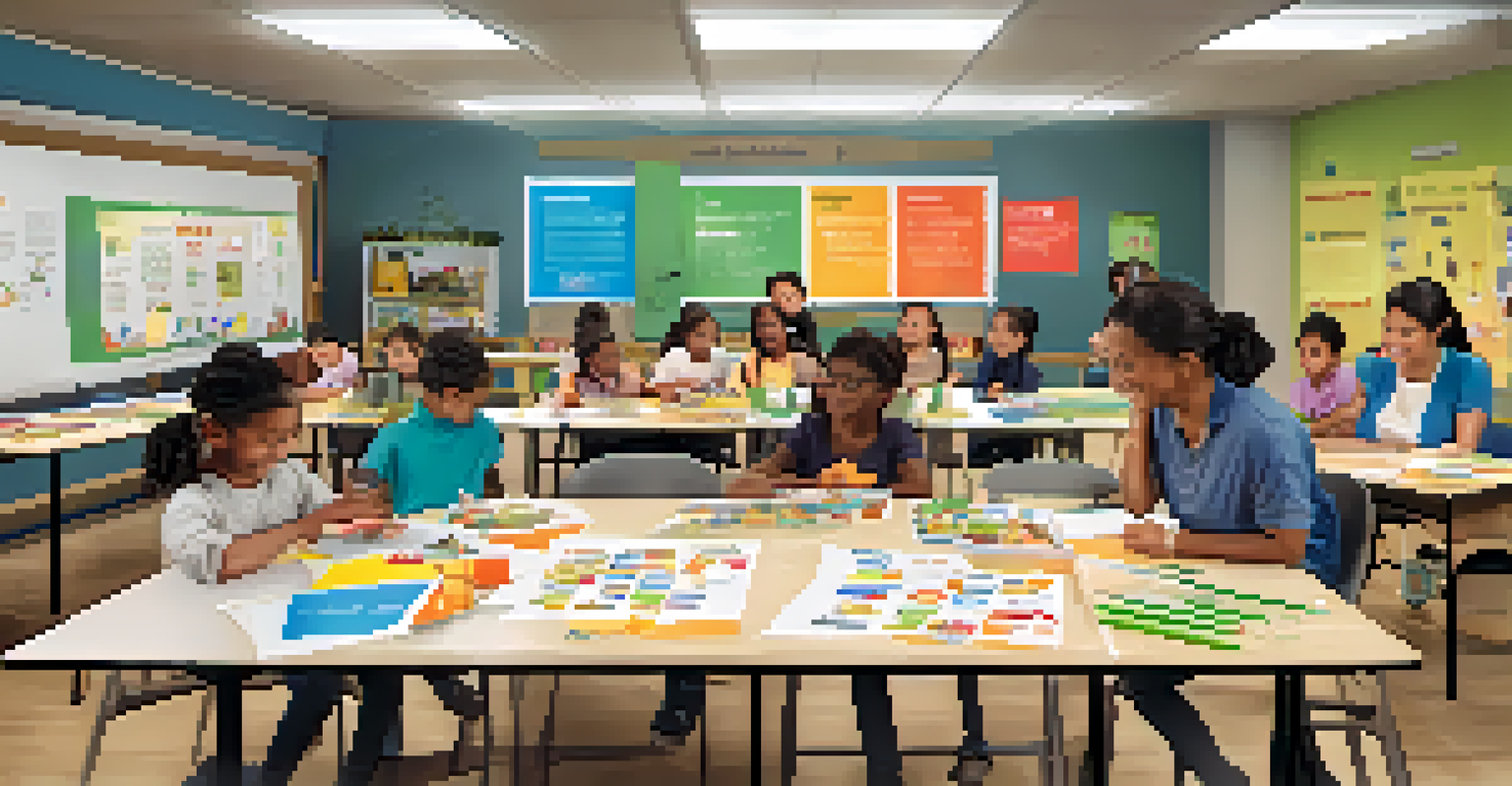Engaging Parents in Project-Based Learning Initiatives

Understanding Project-Based Learning and Its Benefits
Project-Based Learning (PBL) is an educational approach where students learn by engaging in real-world projects. This method encourages critical thinking, collaboration, and problem-solving. When parents understand the benefits of PBL, they can better support their children’s learning journey.
The greatest gift you can give your children is your time.
In PBL, students don’t just memorize facts; they apply knowledge to create tangible outcomes. For instance, a group project on environmental sustainability can inspire students to think creatively about solutions. Parents can help by discussing these projects at home, which reinforces the learning experience.
Engaging parents from the start helps create a supportive network for students. When families see the value in PBL, they are more likely to participate actively, enhancing the educational environment for everyone involved.
Creating Open Communication Channels with Parents
Effective communication is key to engaging parents in any educational initiative, including PBL. Schools can set up regular newsletters, emails, or online forums to keep parents informed about ongoing projects. This transparency helps parents feel connected and invested in their children's education.

In addition to updates, schools can host information sessions where parents can ask questions and share their thoughts. This two-way communication fosters a community atmosphere and encourages parents to voice their ideas. Parents who feel heard are more likely to engage actively in the learning process.
Benefits of Parent Involvement
Engaging parents in Project-Based Learning enhances student support and creates a collaborative educational environment.
Moreover, utilizing social media platforms can enhance communication. Schools can create dedicated groups where parents can share experiences, resources, and feedback about PBL initiatives, creating a vibrant community of support.
Involving Parents in the PBL Process from the Start
Inviting parents to participate in the planning phase of PBL projects can boost their engagement. By seeking their input on project themes or goals, schools can tap into parents' diverse expertise and interests. For instance, a parent with a background in engineering might offer valuable insights for a STEM project.
Education is the most powerful weapon which you can use to change the world.
Involving parents from the beginning also fosters a sense of ownership. When parents contribute ideas, they feel more connected to the educational process, which can translate to greater support at home. It’s a win-win situation that enhances the overall learning experience for students.
Additionally, schools can encourage parents to share their professional experiences related to the project’s theme. This not only enriches the project but also highlights the real-world applications of what students are learning.
Offering Parent Workshops to Build Understanding
Workshops can be an excellent way to educate parents about PBL and its methodologies. These sessions can cover the benefits of project-based learning, strategies for supporting students, and ways to engage with school activities. When parents feel informed, they are more likely to participate actively.
Hands-on workshops where parents can experience PBL activities firsthand can be particularly effective. For example, a workshop might involve parents collaborating on a mini-project, allowing them to appreciate the learning process. This experiential learning can change perceptions and encourage ongoing support.
Effective Communication Strategies
Open communication channels between schools and parents foster a connected community and encourage active participation.
Furthermore, schools can provide resources and tools that parents can use at home. Simple guides on how to facilitate project discussions or resources for additional learning can empower parents to become active participants in their children’s education.
Encouraging Parent Volunteer Opportunities in PBL
Creating volunteer opportunities for parents in PBL initiatives can significantly enhance engagement. Whether it’s helping with research, providing materials, or guiding project groups, volunteering allows parents to be directly involved in their child’s education. This involvement can strengthen the parent-child bond.
Schools can organize events where parents can showcase their skills, such as art, cooking, or science demonstrations relevant to ongoing projects. This not only enriches the project but also builds a sense of community among parents, students, and teachers.
Moreover, recognizing and appreciating parent volunteers can foster long-term engagement. Celebrating their contributions during school events or through newsletters can motivate more parents to get involved, creating a culture of collaboration.
Highlighting Student Work to Keep Parents Engaged
Showcasing student projects can be a powerful way to keep parents engaged in PBL. Schools can hold exhibitions or presentations where students share their work with families. This not only celebrates student achievements but also allows parents to see the impact of their involvement.
Digital platforms can also be utilized to spotlight student projects. Schools can create online galleries or social media posts highlighting students’ hard work, inviting parents to comment and share. This visibility can generate excitement and appreciation among families.
Workshops Enhance Understanding
Offering workshops for parents helps them grasp PBL methodologies, empowering them to support their children effectively.
Additionally, featuring success stories in newsletters or local media can further engage parents. When families see the positive outcomes of PBL, they are more likely to stay involved and support future initiatives.
Creating a Supportive Community for Parents
Creating a supportive community for parents is vital in fostering ongoing engagement in PBL. Schools can establish parent-teacher associations or support groups where parents can share experiences and strategies. This sense of community can empower parents and lessen feelings of isolation.
Regularly scheduled community meetings can also provide a platform for parents to connect and collaborate. These meetings can focus on discussing challenges, sharing successes, and brainstorming new ideas for PBL initiatives. The more connected parents feel, the more likely they are to participate actively.

Moreover, schools can invite guest speakers to discuss educational topics relevant to PBL. This not only enriches parents’ understanding but also demonstrates the school’s commitment to fostering a collaborative environment.